#and has a history of colonialism behind it
Text
“The reason why people draw Dorian as a bellydancer is because he’s from a hot climate-” I’m begging you to drop the ‘hot climate = less clothes’ thinking

#raqs sharqi originated in Egypt and I can tell you as someone with fam there#they do not wear bellydancer outfits#and that has never been the traditional clothing there#i cannot believe I am hearing this#everyday I question why I remain in this fandom lmao#dragon age fandom critical#orientalism#there are cultures from warm climates who wear less clothing#but in the lense of bellydance outfits it’s particularly racist#and has a history of colonialism behind it
103 notes
·
View notes
Text
ds in the hands of levine and steinberg ... the things they could do with vicki.
#IDK I THINK ABOUT BLACK SAILS IN CONJUNCTION WITH DS A LOT ACTUALLY.#not that that's surprising given how many crossover edits i make lol#➤ ooc. ┊ she’s nauseous,she’s hysterical,and she’s exhausted.#when chas comes out of the grave.#names. and naming. and the things that do or dont lie behind them.#part of the family (threat)#''she came to us from nowhere and now it seems she has disappeared into nowhere'' /#''it was as if the sea had conjured that man out of nothing and then taken him back for some unknowable purpose''#the imitation of domesticity and the family. art and legacy.#the power of story and history and the written record. the institutions that form colonial settlements and the Other that interrupts them.#what is pushing bill malloy into the water if not pushing billy bones into the water.
3 notes
·
View notes
Text

Celebrate Pride with Tor Publishing Group!

Rakesfall by @adamantine
They met as children in the middle of the Sri Lankan civil war. Later, in a demon-haunted wood, an act of violence linked them and propelled their souls on a journey through the ages. As they reincarnate ever deeper into the future, a truth emerges: Some stories take more than one lifetime to tell.
Running Close to the Wind by @ariaste
In this queer pirate fantasy, Avra Helvaçi has accidentally stolen the single most expensive secret in the world. To avoid capture, he flees to the open sea, where only his on-again, off-again ex aka pirate Captain Teveri az-Ḥaffār can help him survive, profit, and become a legend.

Cuckoo by Gretchen Felker-Martin
Something evil is buried deep in the desert. It wants your body and wears your skin. Welcome to Camp Resolution, a queer conversion center where everyone leaves a different person. In 1995, seven queer teens were abandoned here by their parents, but survived. Sixteen years later, they’re scarred and broken, but back to face an evil that threatens the world.
Kinning by Nisi Shawl
In this alternate history where barkcloth airships soar and former colonies claim freedom from imperialist tyrants, the identity of the island of Everfair still wavers. Victorious in the wake of the Great War, a new threat looms. Can Everfair continue to serve as a symbol of hope for anticolonial movements around the world, or will it fall to forces within and without?

Can’t Spell Treason Without Tea by @rebeccathornewrites
Can one of the Queen’s private guard and the most powerful mage in existence leave their lives behind to settle down in their new bookshop that serves tea? This cozy fantasy is steeped in sapphic romance and nestled on the edge of dragon country.
The Fragile Threads of Power by V. E. Schwab
Once there were four worlds, nestled like pages in a book, each pulsing with fantastical power and connected by a single city: London. After a desperate attempt to prevent corruption and ruin in the four Londons, there are only three. Now the worlds are going to collide anew—brought to a dangerous precipice by the discoveries of three remarkable magicians.
Now available in paperback!

The Archive Undying by @emcandon
This is a story about misplaced faith, complicated love, so much self-loathing, and yeah—giant robots. Plugged into his AI god when its apocalyptic corruption renders him unfortunately immortal, sad gay disaster Sunai takes a die-again-or-die-trying approach to things. Unending life’s tough when intimacy is somehow scarier even than either of the warring police states set on turning you into a weapon or the rogue undead mecha-fragment of your old god that wants to eat you.
Now available in paperback!
The Bell in the Fog by Lev AC Rosen
A dazzling historical mystery that dives into the shadowy, closeted world of the Navy, emerging in the gay bars of the city. It’s a whirlpool of missing people, violent strangers, and scandalous photos in 1952 San Francisco.
Now available in paperback!
Celebrate Pride with more titles from Tor Publishing Group here!
#the archive undying#emma mieko candon#the bell in the fog#lev ac rosen#can't spell treason without tea#rebecca thorne#the fragile threads of power#v e schwab#cuckoo#gretchen felker-martin#kinning#nisi shawl#running close to the wind#alexandra rowland#rakesfall#vajra chandrasekera#tor books#tor publishing group#bramble romance#nightfire books#forge books#bramble#tordotcom publishing#tdcp#lgbtqia+#gay reads#tbr#new books
4K notes
·
View notes
Text
As a second generation Lebanese Australian from a Lebanese family who's always been pro-Palestine, it's so important to view the occupation's drone bombing of Beirut in context. 1) Zionist forces have been bombing the south for over 70 days with missiles and illegal white phosphorus bombs. 2) The 100s of 1000s od Palestinians in Lebanon are heavily discriminated against by the Lebanese government. Palestinian refugees who have lived in Lebanon for generations are denied rights to own property, work, healthcare, and education. 3) This is a reality that co-exists with the Zionist occupation historically treating Lebanon as an "enemy state", with the occupation invading, occupying, and massacring people in Lebanese territories as early as 1949 and as recent as 2006. 4) There is an ultra-right Christian nationalist sect in Lebanon who have historically supported the Zionist occupation, going so far as to form a small militia to assist the occupation in the Shatila and Sabra refugee massacres in which over 3,000 Palestinian and Lebanese people were slaughtered. 5) The Zionist occupation has been leveraging Lebanon's dire economic crisis to take more control over Lebanon's oil and gas fields. There is a huge history behind the occupation's drone strike and assassinations in Beirut today. A history that shows how the Zionist entity's boot on the necks of the surrounding governments has only led to the perpetration of more violence against Palestinians in these nations, as well as citizens of those nations. This is what settler colonial entities do. It's all they can do: division and violence. And when the coloniser can't do the violence themselves, they engineer conditions for others to do it for them under threat of violence. A ceasefire is not enough. The Zionist occupation of Palestine and the Levant must end.
2K notes
·
View notes
Text
South Africa’s genocide case has put the spotlight on a deeper fault line in global geopolitics. Beyond the courtroom drama, experts say divisions over the war in Gaza symbolize a widening gap between Israel and its traditional Western allies, notably the United States and Europe, and a group of nations known as the Global South — countries located primarily in the southern hemisphere, often characterized by lower income levels and developing economies.
Reactions from the Global North to the ICJ case have been mixed. While some nations have maintained a cautious diplomatic stance, others, particularly Israel’s staunchest allies in the West, have criticized South Africa’s move.
The US has stood by Israel through the war by continuing to ship arms to it, opposing a ceasefire, and vetoing many UN Security Council resolutions that aimed to bring a halt to the fighting. The Biden administration has rubbished the claim that Israel is committing genocide as “meritless,” while the UK has refused to back South Africa.[...]
As a nation whose history is rooted in overcoming apartheid, South Africa’s move carries symbolic weight that has resonated with other nations in the developing world, many of whom have faced the burden of oppression and colonialism from Western powers.
Nelson Mandela, the face of the anti-apartheid movement, was a staunch supporter of the Palestine Liberation Organization and its leader Yasser Arafat, saying in 1990: “We align ourselves with the PLO because, akin to our struggle, they advocate for the right of self-determination.”
Hugh Lovatt, a senior policy fellow with the Middle East and North Africa Programme at the European Council on Foreign Relations, said that while South Africa’s case is a continuation of its long-standing pro-Palestinian sympathies, the countries that have rallied behind it show deeper frustrations by the Global South.
There is “a clear geopolitical context in which many countries from the Global South have been increasingly critical over what they see as a lack of Western pressure on Israel to prevent such a large-scale loss of life in Gaza and its double standards when it comes to international law,” Lovatt told CNN.
Much of the non-Western world opposes the war in Gaza; China has joined the 22-member Arab League in calling for a ceasefire, while several Latin American nations have expelled Israeli diplomats in protest, and several Asian and African countries have joined Muslim and Arab nations in backing South Africa’s case against Israel at the ICJ.
For many in the developing world, the ICJ case has become a focal point for questioning the moral authority of the West and what is seen as the hypocrisy of the world’s most powerful nations and their unwillingness to hold Israel to account. [...]
Israel sided with the West against Soviet-backed Arab regimes during the Cold War, and Western countries largely view it “as a fellow member of the liberal democratic club,” he added.[...]
“But the strong support of Western governments is increasingly at odds with the attitudes of Western publics which continue to shift away from Israel,” Lovatt said.
Israel has framed the war in Gaza as a clash of civilizations where it is acting as the guardian of Western values that it says are facing an existential threat.
“This war is a war that is not only between Israel and Hamas,” Israeli President Isaac Herzog told MSNBC in December. “It’s a war that is intended – really, truly – to save Western civilization, to save the values of Western civilization.”
So far, no Western countries have supported South Africa’s case against Israel.
Among Western states, Germany has been one of the most vocal supporters of Israel’s campaign in Gaza. The German government has said it “expressly rejects” allegations that Israel is committing genocide in Gaza and that it plans to intervene as a third party on its behalf at the ICJ.
An opinion poll by German broadcaster ZDF this week however found that 61% of Germans do not consider Israel’s military operation in the Gaza Strip as justified in light of the civilian casualties. Only 25% voiced support for Israel’s offensive.
But it is in Germany’s former colonial territory, Namibia, that it has attracted the fiercest criticism.
The Namibian President Hage Geingob in a statement on Saturday chided Berlin’s decision to reject the ICJ case, accusing it of committing “the first genocide of the 20th century in 1904-1908, in which tens of thousands of innocent Namibians died in the most inhumane and brutal conditions.” The statement added that the German government had not yet fully atoned for the killings.
Bangladesh, where up to three million people were killed during the country’s war of independence from Pakistan in the 1970s, has gone a step further to file a declaration of intervention in the ICJ case to back South Africa’s claims, according to the Dhaka Tribune.
A declaration of intervention allows a state that is not party to the proceedings to present its observations to the court.
“With Germany siding with Israel, and Bangladesh and Namibia backing South Africa at the ICJ, the geopolitical divide between the Global South and the West appears to be deepening,” Lovatt said.
Traditionally, the West has wielded significant influence in international affairs, but South Africa’s move signals a growing assertiveness among Global South nations that threatens the status quo, says Adekoya.
“One clear pattern emerging is that the old Western-dominated order is increasingly being challenged, a situation likely to only further intensify as the West loses its once unassailably dominant economic position,” Adekoya said.
19 Jan 24
2K notes
·
View notes
Text
I remembered this essay from years ago when I was unlearning what I knew of Israel and zionism and I couldn't find it again, and now I see it in a Shaun video, with the source.
Ze'ev Jabotinsky, "The Iron Wall." I downloaded it from the Jabotinsky Institute.
These are the titles he gave this essay:

I said that Zionist leaders explicitly talked about Zionism as a colonialist movement. This is an example of what I was talking about.
Some quotes:
There can be no voluntary agreement between ourselves and the Palestine Arabs. Not now, nor in the prospective future. I say this with such conviction, not because I want to hurt the moderate Zionists. I do not believe that they will be hurt. Except for those who were born blind, they realised long ago that it is utterly impossible to obtain the voluntary consent of the Palestine Arabs for converting "Palestine" from an Arab country into a country with a Jewish majority.
My readers have a general idea of the history of colonisation in other countries. I suggest that they consider all the precedents with which they are acquainted, and see whether there is one solitary instance of any colonisation being carried on with the consent of the native population. There is no such precedent.
He's saying openly: no land was colonized with the consent of its indigenous population. So we have to do it without that consent.
Every native population in the world resists colonists as
long as it has the slightest hope of being able to rid itself of the danger of being colonised.
That is what the Arabs in Palestine are doing, and what they will persist in doing as long as there remains a solitary spark of hope that they will be able to prevent the transformation of "Palestine" into the "Land of Israel."
He said that any zionist who depends on the Arab population accepting a Jewish state on their lands, might as well withdraw from zionism because that's impossible.
Zionist colonisation must either stop, or else proceed regardless of the native population. Which means that it can proceed and develop only under the protection of a power that is independent of the native population – behind an iron wall, which the native population cannot breach.
And then he says that this Iron Wall is the British Mandate and the Balfour Declaration - they're the power that stops Palestinians from resisting us.
He says that despite this, zionism is moral and just, so justice must be done, zionism must move forward. He just wants to be honest about what it takes. He wants to discourage talks of an agreement to avoid signaling to the British that they must try to reach one between us and Palestinians. Just stop them from fighting us, we'll colonize the place.
Zionism was openly colonialist until this language was no longer politically useful.
Editing because I was kinda shocked by the response this got, in several moments. When the slavery of US founders was brought up to dismiss this whole thing. When First Nations reservations were brought up on the same list as the United States as equivalent to Israel, because I said I oppose the existence of a country that prioritizes one ethnic group at the expense of others, and I support democracy that protects everyone equally.
But another thing that's still nagging at me is the idea that this whole essay can be dismissed based on semantic arguments, like sure this uses the word colonialism, but is it actually the colonialism that we talk about and oppose? And what if this word is only used to appeal to the British for support?
This isn't the the first time that prominent zionist thinkers talk about zionism as a colonialist movement. I saw it in old publications, things like magazines, I'd be posting them too if I found them again. I did my own deconstructing years ago, I don't remember where I found all my sources.
I do remember that they talked about the two concepts together - the idea that we're here to colonize, and that we're here to come home. So nowadays there's the arguement that people can't colonize their own homeland, but to them there was no contradiction. I saw it again looking at Herzl's diary last night.
I say I define colonialism through actions and tactics, through the harm that's done to the victims of colonization. Because if we knowingly repeated the actions of colonizers and used the help of an imperial force to conquer a land, having a historic connection to it shouldn't absolve us.
Jabotinsky didn't write to the British in this essay. He wrote to other zionists who wanted to aim for something more collaborative with Palestinian Arabs. And it's true that word choice can mean different things in the context of the time, but there's a reason I chose those quotes. What is he actually saying in this essay?
Consider colonization throughout history - the native population never agreed, so we must do the as colonizers did in the past.
Palestinians will never agree to a Jewish state - so we must do it by force. We should use an imperial force as an "iron wall" to prevent them from resisting. Stop talking about an agreement because then the British will try to reach one instead of holding them back and letting us do our thing.
He's comparing the zionist movement to other efforts of colonization, to talk about emulating them.
This isn't a game of semantics. I'm not just bringing this up just because he used the words.
What he's describing - conquest by force, preventing a Palestinian state, forcibly creating a Jewish majority - is what happened. And it's still what's happening.
This is the branch of zionism that went into practice and founded Israel.
1K notes
·
View notes
Text
Looks like it's time to talk about starseeds and the New Age movement again.
Since I'm seeing more starseed content being posted, I'm gonna make another post on why the whole starseed thing and the surrounding New Age belief system are... not good.
So for those who don't know, New Age mythology is essentially a hodgepodge of cherrypicked and distorted myths from various cultures, racist pseudohistory, and far right conspiracy theories. To put it very briefly, starseeds are supposedly here to help Earth resist the reptilians, a race of politics-manipulating, war-starting, media-controlling blood-drinking aliens. For those who don't recognize the tropes here, these are basically all antisemitic canards. The reptilian alien myth as most know it today comes from David Icke, who ultimately cribbed a bunch of his material from The Protocols of the Learned Elders of Zion, a Russian hoax created to justify violence against Jews. He was also influenced by the work of people like Fritz Springmeier, a hateful crank who based much of his work on other hateful cranks.
(David Icke, by the way, also claims that transgender is an evil reptilian conspiracy. You'll never find just one form of bigotry with these people.)
There are supposedly numerous alien races out there, and one of the most prominent among them are the Pleiadians, AKA Nordics. While modern depictions of the Pleiadians give them more variety in skintone, there's no denying that older Pleiadian mythology basically pictured them as Aryans In Space, even associating them with the swastika.
You see what's going on here? "Good" swastika-loving Aryan aliens versus "evil" Jewish aliens? Sound familiar?
Racism isn't just a tangential part of the starseed myth, either. It lies at its very core. It's inextricably tied in with the ancient astronaut hypothesis, which has a history of racist motivation behind it. The TL;DR is that a bunch of white people couldn't believe that non-white people had built a bunch of things they couldn't figure out how to build themselves (EG, the Great Pyramids), so they proposed that the real builders were anyone from Atlanteans to aliens. (Atlantis, by the way, never existed; it was a literary device created by Plato.)
One supposed purpose of starseeds is to help the world "wake up to the truth," which basically just means "convert people to New Age spirituality." New Age believes that world peace is contingent on a majority of the world being converted to New Age belief, and that resistance against their belief system is ultimately the work of the aforementioned reptilian aliens.
To put it another way, New Agers think they understand other cultures' spiritual traditions better than the actual members of said cultures, and think that anyone who disagrees with them is being manipulated by the conspiracy, or is an agent of the conspiracy. This includes Indigenous cultures which are already endangered from white Christian colonialism.
Essentially, endangered cultures cannot speak up for themselves and resist New Agers' efforts at cultural assimilation without being labeled a problem and an enemy. It's basically white Christian colonialism repackaged as "spiritual, not religious."
Again - if you heard from these people that some ancient text or myth describes extraterrestrial beings visiting our planet for one reason or another, you heard misinformation. They twist and misrepresent literally every myth and text they get their hands on. For example, you may have heard that the vimanas from Hindu traditions were actually alien spacecraft. They were no such thing. Or maybe you heard that the Book of Enoch describes aliens performing genetic experimentation on humans. It literally does not. At best, all of the stories they cite just kind of sound like aliens if you ignore most of their content and pay no attention to their cultural contexts.
The starseed movement preys on alienated people, especially autistic people and people with ADHD. You can look up nearly any list of signs that you're supposedly a starseed, and many of them will align perfectly with characteristics associated with autism and/or ADHD, or that people with these conditions commonly report. Some people within the movement even go so far as to claim that ADHD and autism don't even exist, but were actually made up by the conspiracy as a cover to suppress and control starseeds, which is some yikes-as-hell ableism.
So basically, people are being told that if they have these certain characteristics or symptoms, that means it's their job to spread New Age spirituality to defeat the conspiracy and help others ascend to the fifth density.
And what's the fifth density, you might ask? It's supposedly humanity's next evolutionary level, because New Age is also based on biological misconceptions. Supposedly once everyone's DNA "upgrades," they'll essentially morph into an aetheric form. Supposedly, this is preceded by a number of "ascension symptoms," including depression, headache, gastrointestinal issues, and any number of other symptoms that could indicate almost anything, including stress.
What many of these people don't realize is, this prediction has already failed. Back in the 2000s and 2010s, experiencing "ascension symptoms" was supposed to precede ascension to 5D beginning December 21, 2012. One lady, Denise Le Fay, was convinced that the hair loss she was experiencing in 2008 was an ascension symptom. As we can see by looking her up, she's very much still with us on the 3D plane these days, repeating the same tired old scripts New Agers recycle endlessly.
By the way, everything you near New Agers saying today about old systems being dismantled, dark forces being arrested or kicked off the planet, and new economic systems on the horizon? They've been recycling these scripts for years now. Take a look at this page written back in 2012. You got stuff about the complete dismantling of an enormous network of sinister forces," "the arrest and removal of a world-wide cabal," and a "new economic system."
("Cabal," by the way, is a dogwhistle term for "Jews.")
Furthermore, people in this movement are often encouraged to try and access past life memories through dreams or hypnosis, which makes the whole thing feel even more real to them. But the thing is, you can have incredibly vivid experiences about literally anything you put your mind to - the people in the reality shifting having vivid experiences of living another life in the Harry Potter universe are a great example of this. Just because you have vivid experiences, doesn't mean they have any bearing on anything happening in this reality.
So yeah, the starseed movement and the larger New Age movement are both extremely harmful. They promote racist pseudohistory, medically-irresponsible pseudoscience, conspiracy theories that target numerous marginalized groups, and functionally target aliened people with ADHD and autism to convince them that spreading its beliefs is their job.
#starseed#starseeds#new age#new age beliefs#ascension#5d#fifth density#spirituality#racism#antisemitism#ableism#transphobia#ascension symptoms#conspirituality#conspiracy theories#conspiracism#ancient aliens#ancient astronauts#ancient astronaut hypothesis#aliens#extraterrestrials#pseudoarchaeology#archaeology#pleiadians#pleiadian#dna upgrade#autism#adhd#colonialism
1K notes
·
View notes
Text
I hate a lot of trends in climate-change-aware nature writing, but this is one I particularly detest: works insisting that we live in a "post-natural" world.
The lostness, bewilderment, aching, and searching in this piece is understood by the author to be an all-consuming and universal dysphoria, when it is actually a highly specific predicament that the author put himself into: He tried to understand the universe exclusively through the point of view of white people.
I mean that Purdy takes the colonizer point of view without realizing that it is a colonizer point of view. He thinks the colonizer point of view is a universal document of the authentic, naive encounter of "humanity" with "nature," instead of burning wreckage left over from the apocalyptic destruction of a rainbow of ideas and cultures.
It feels weird to be talking about this as a white person, but it shouldn't, any more than it should feel weird to say (as a white person) that aliens didn't build the pyramids.
Very little of what he's writing about would exist or make sense without European colonization of the world. Purdy constantly says "we" and "our" in reference to things that are very restricted to a particular cultural point of view, as if totally oblivious to the idea that other cultures and other perspectives even exist. When he searches for historical references to chart "human" relationship with nature, history goes like this: Pre-Christian religion in the British Isles->British monarchy-> George Washington-> Industrial Revolution->Thoreau.
He manages to repeatedly stumble over giant hunks of colonialism embedded in every concept he's thinking about, like boulders obstructing a pathway, and pretends so hard that they don't exist that his points are janky and meandering. For example, his discussion of Helen Macdonald's book H for Hawk, touching upon human identification with the landscape and with non-human "nature," blunders into this:
Those who love (certain parts of) nature are often making a point of preferring it to (certain kinds of) human beings. The problem is not only literary. Macdonald describes an encounter with a retired couple who join her in admiring a valley full of deer, then remark how good it is to see “a real bit of Old England still left, despite all these immigrants coming in.” She does not reply, but is miserable afterward. The meaning of landscapes is always someone’s meaning in particular.
Confronted with all of this, Macdonald tries to shake off the complicities of her own identification with the terrain: “I wish that we would not fight for landscapes that remind us of who we think we are. I wish we would fight, instead, for landscapes buzzing and glowing with life in all its variousness.” The alternative that Macdonald wishes for is, of course, not an escape from political-cultural projection onto landscape, but another approach to that same practice — really, the only one a 21st-century cosmopolitan is likely to feel comfortable embracing.
AND THEN HE JUST SEGUES INTO THE NEXT POINT LIKE NOTHING HAPPENED. Like don't worry about it :) We will simply project onto landscapes in a non-racist way :) because we aren't racist anymore in the 21st century :)
The next book he discusses is Landmarks by Robert MacFarlane, which is basically about how the vocabulary of landscape in English is sterilized and monoculturized, and contrasts that with Scots Gaelic. This is how Purdy explains the thesis of the book:
Our sense of what lies outside ourselves has been blunted by “capital, apathy, and urbanization” — enemies likely to draw a range of friends, from cultural Marxists to Little Englanders to those who would like to see a bit more effort, please. But behind this scholarly sketch, Macfarlane’s work is testament to a pretheoretical obsession with unfamiliar ways of encountering places. We disenchanted and distracted (post)moderns describe terrain, he complains, in terms of “large, generic units” such as “field,” “hill,” “valley,” and “wood." (...) Many people who have lived intimately with landscapes have had words for nuances of form, texture, and use. Macfarlane’s purpose in Landmarksis to gather these words as proof of how precisely it is possible to name a place, and so, perforce, to know it.
Why is Gaelic endangered? Because of an effort to extinguish its speakers' culture. This article I found on it talks about the history of the language's decline, and it's strikingly similar to what happened to indigenous people in the Americas and Australia, with children being put in schools where they were beaten with sticks for speaking their native language.
This whole essay is about Purdy's general disappointment with nature writing, his craving for an ineffable Something, some sort of magical, primitive identification with the natural world. In the very first paragraph he claims that the pictures of animals on nursery walls are "totemic" and quotes a guy saying that zoos are an "epitaph" to the relationship between people and animals. It's never very clear what he means, but he uses the term "animism" repeatedly, such as when he says this about MacFarlane's goal in writing Landmarks:
His quarry is an animistic sense that Barry Lopez once identified in “the moment when the thing — the hill, the tarn . . . ceases to be a thing, and becomes something that knows we are there."
Given that ambition, Landmarks, which Macfarlane calls a “counter-desecration phrasebook,” can be disappointingly thin as a lexicon. Too many of the terms are simply dialect or Gaelic for some generic form, such as “slope,” “hilltop,” “stream,” or “tuft of grass.” The effect is less pointing out how many things there are to see than cataloguing how many names there are for the same thing.
This is Purdy missing the point, perfectly crystallized as though frozen in amber. He is oblivious to the clear subtext of a language showing a culture's connection to its home, and of the violence against that culture. The Gaelic language doesn't make him feel primal and mystical the way he wants it to, therefore it doesn't mean anything to him. MacFarlane doesn't make him feel a magic animistic connection to nature, therefore his book must have failed at its task.
Who gives a shit? Gaelic isn't FOR you.
He discusses another book about a guy that hikes a bunch of Cherokee trails, but I don't know what to say about that one, observing it through the sludge of the reviewer's unwillingness to recognize that historical context exists. He summarizes his disappointment in a confusing way, using the Gaelic language as a symbol for an obscure and inaccessible place where the answer to your personal emotional cravings lives (???) Then he talks about a kind of epistemicide, or extinction of knowing, of nature, but again, totally oblivious to any relationship to colonization.
Every inhabited continent has been denuded of ecosystems and species. Most North American places have shed wolves, elk, moose, brown bears, panthers, bison, and a variety of fish and wild plants, which were all abundant four hundred years ago.
Wow, I wonder what happened four hundred years ago?
This writing acts like the dominant Eurocentric attitude towards the world is universal, but the author is haunted by this nameless specter of the possibility of a different way of thinking, which he treats as some kind of mystical, primordial state hidden in the past instead of just a different cultural perspective.
Not only does he not recognize that his own cultural perspective of Nature is dysfunctional and unsatisfying because it was created by exploitation and genocide of other cultures and their symbiotic relationships, he acts like other perspectives don't exist. Take his perspective on forests and the mycorrhizal network:
Wohlleben’s emphasis on interdependence and mutual aid is part of a recent tendency to recast nature in an egalitarian fashion — as cooperative, nonindividualist, and, often enough, hybrid and queer, in contrast to the oaks of generals and kings. Nature does answer faithfully to the imaginative imperatives and limitations of its observers, so it was inevitable that after centuries of viewing forests as kingdoms, then as factories (and, along the way, as cathedrals for Romantic sentiment), the 21st century would discover a networked information system under the leaves and humus, what Wohlleben calls, with an impressive lack of embarrassment, a “wood wide web.”
Listen, I don't think this is accurate to how Europeans thought of forests throughout time, let alone "humanity" in general. The emphasis of power and competition in ecosystems emerged after Darwin, in collusion with capitalism and "race science." Trees have been symbols of life, wisdom and selflessness, and regarded as sacred or even sentient, for centuries before that. But on top of that, this is just blatantly pretending that only white people's ideas count as ideas.
It's the same dreck as all the other "literary" writing about climate change: self-pityingly and unproductively mourning "Nature" and a fantasized "wild" state of the Earth, ignoring colonialism, treating human influence of any kind on other life forms as something that either destroys them or makes them soft and "tame."
I'm tired of reading nature writing from people that obviously do not go outside, or if they do, they do it in such a suffocatingly regimented, goal-oriented way that they can't just sit outside and relax.
Maybe I shouldn't be such a hater if I want to do nature writing. But my love of nature is WHY I am a hater.
413 notes
·
View notes
Note
Can you elaborate on what you think would be the minimal needed changes to fix what you see as an issue in Civ? Civ has done fairly large shifts in some mechanics before, and "civ like" is still an interesting game space that can scratch certain itches
yeah i mean as i said, the baked-in racism arises from a certain set of core assumptions that i think lock it into that position, which are that civ is a
1) symmetrical
2) 4X
game about
3) 'real world civilizations' (deeply loaded terms ofc but that's how civ envisions them)
4) trying to 'win the game'
5) with a global
6) and transhistorical
scope
so, in its role as a symmetrical (1) game with victory conditions (4), civ as a text has to take positions on what constitutes a 'successful civilization'. as a (2) 4X game this definition also has to include some variation on the profoundly loaded eponymous Xs, 'explore, expand, exploit, and exterminate'. furthermore, as a (1) symmetrical game with a global, transhistorical (5, 6) scope, it has to necessarily create a model of what 'a civilization' looks like and apply it to every 'civilization' it wants to include, at all points in their history.
this all kind of naturally leads into civ being a game in which the colonial european imperialist powers are the default 'civilizations' and all other cultures are basically just like them -- a game where technology progresses linearly and innovations are made in the order they were in european imperial history -- a game where all cultures fundamentally work in the same way and hold similar values, a game where all religions are based on christianity (i mean, just look at civ vi's system, where every religion has a 'prophet', 'apostles', 'missionaries' and 'inquisitors'), a game where not only do cultures have teleological overarching 'goals' but where these goals are shared and these goals are fundamentally based on imperialist visions of 'victory'.
to drill into some specific examples: you can't play a game of civilization without founding cities. you will constantly be founding cities. when you're playing as 'the mongols' or 'the cree' or 'scythia', this makes no sense! these were peoples who historically had rich culture, science, arts, and certainly a notable military history, but were (to varying degrees, at varying times in their history, i don't mean to create a new and similarly heterogenous absolutist category here) nomadic!
similarly, to advance in civilization you must invent 'the wheel'. 'the wheel' is necessary to many later innovations, while of course the andean peoples represented by the playable 'inca' never made significant use of the wheel because the lack of suitable pack animals and environmental factors meant that it did not, in fact, prove a suitable tool for transporting large quantities of heavy goods. for an even more glaring example, a lot of early military technology is locked behind 'horses', which is pretty absurd considering that several of the game's playable civilizations, in the real world, developed plenty of military technology despite living on a continent without any horses!
so having established what i mean by 'the issue', which is that the game's core assumptions lock it into imposing a eurocentric, imperialist vision of 'civilization' onto cultures where it doesn't make sense, here's a few different jenga blocks you could pull out to resolve it:
SID MEIER'S EUROPE
the pillar you knock out here is #5. keep the game engine and core assumptions just as founded on eurocentric imperialist societies as they are now, and just make it about european empires doing imperialism. now, i think we can immediately spot some problems in there -- how are we going to represent the rest of the world? after all, this kind of just creates a situation where, either as NPC factions or as outright exclusions, all other cultures in the world are deprived of any meaningful agency in "history". this one just kind of gives you a new problem and also from a gameplay standpoint results in a game that just Has Less Stuff On It. i think this is a bad one
SID MEIER'S ELYSIUM
now here's one you can get if you knock out pillar #3. keep the same assumptions and gameplay and transhistorical global narrative scale, but remove the 'real-world' aspects. you can get real silly with it and add fantasy stuff to it, or you can be a relatively grounded 'our-world-but-to-the-left' situation. now to some extent this already matches a lot of the features already in civ games: after all, unless you specifically load in a 'true start location earth' map, you're usually playing on a strange parallel world with semiplausible but wholly original continents! now, you also need to get some fucking Nerds and Geeks working at your company to build out your fictional world, or you'll just end having pointlessly pallette swapped a bunch of factions that are now just Schmance, Schmina, and the Schoman Schempire, and not really have avoided the issue. but if you do that, and invent a deep and rich fictional history to riff on, then you could create something really cool and incorporate alt-tech or fantasy or retrofuturistic elements or all sorts of cool shit.
the downside of this is that it makes your game less accessible and appealing to a lot of people. a big part of (at least the initial) appeal of civilization is pointing at the screen and saying 'hey i recognize that thing!'. it is instantly more accessible to someone who isn't super invested in strategy or fantasy dork shit to say to them 'you can be BRAZIL and nuke FRANCE while at war with CHINA and allied to BABYLON'.
more importantly than that, i think some parts of the historical theming (because let's be honest, it is ultimately theming, i don't think civ is interested in 'history' in any serious way) serve a pretty load-bearing role in the game's information economy. it's a pretty tall order to ask a player to remember the unique abilities of dozens of factions and unique wonders, and the historical background makes it a lot easier. e.g., it is a lot easier for a player looking at wonders to remember 'the pyramids need to be built on desert' or 'broadway will help me make more culture' than it would be for them to remember the requirements/effects of 'under-eusapia' or the 'wompty dompty dom center'. i think this is one of the number one things that, if subtracted, would meaningfully create something that is no longer 'sid meier's civilization'.
SID MEIER'S ALPHA CENTAURI
now if you cut out #3 and #5 and #6 on the other hand... sid meier's alpha centauri is not technically an entry in the civilization franchise, but i think most people correctly consider it one. it has similar 4X gameplay to the series, and its (very bad) spiritual successor beyond earth was an official entry. instead of 'civilizations', the playable factions are splinters from a colony ship that fell into civil war as soon as it landed, each one representing a distinct ideology. now, y'know, this doesn't mean it's free from Some Problems (the portrayal of the Human Hive in particular is some of the worst apects of 90s orientalism all piled together) but i think they're problems it's not at all locked into by its design!
SID MEIER'S THERMOPILAE
by cutting out #5 and #6 -- making a civ game about a particular time and place in history you could achieve something much more richly detailed in mecahnics while also being able to handwave a lot more homogeny into it. giving the same basic mechanics to, say, every greek city-state in the peloponnesian war is far less ideologically loaded than giving them to every 'historical civilization' someone who watched a few history channel documentaries once can think of. it also lets you get really into the weeds and introduce era-and-place-specific mechanics.
the scale needs to be smaller conceptually but it doesn't really have to be smaller in terms of gameplay -- just make maps and tech trees and building more granular, less large-scale and more local and parochial and specific. this also gives you the advantage of being able to do the opposite of the last two options and really lean hard into the historical theming.
if this sounds like a good idea to you, then good news -- old world does something pretty similar, and it's pretty good! worth checking out.
SID MEIER'S LOVE AND PEACE ON PLANET EARTH
what if we take an axe to #2 and #4? instead of putting all these civilizations into a zero-sum game of violent expansion, make it possible for several civilization to win, for victory goals to not inherently involve 'defeating' or 'beating' other factions. now, that doesn't mean that the game should be a confictless city-builder -- after all, if you've decided to be super niceys and just try and make your society a pleasant place to live, that doesn't mean that the guy next to you isn't going to be going down the militarist-expansionist path. hell, even if all you want to do is provide for your citizens, a finite map with finite resources is going to drive you into conflict of some kind with your neighbours in the long run.
to make this work you'd have to add a bunch of new metrics -- 'quality of life', for example, as a more granular and contextual version of the 'happiness' mechanics a few games have had, or 'equality', game metrics that you could pursue to try to build an egalitarian, economically and socially just society where everyone is provided for. after all, why shouldn't that be a goal to strive for just as much as going to mars or being elected super world president or whatever?
SID MEIER'S DIVERSE HISTORICAL CONTEXTS
ultimately, all cards on the table, if i was made god-empress of The Next Civ Game, this is the option i'd go for: jettison #1 as much as practically possible, introduce as much asymmetry into the game as you can. some civilizations keep the established settler-city model -- others are nomadic, building their units in movable 'camps' -- maybe the 'colonial' civilizations, your USA and Brazil and so on, can be like the alien factions from the alpha centauri DLC, only showing as NPCs at the appropriate point in the timeline when other civs are colonizing other continents, or putting you into an accelerated-forward version of the game if you choose to play as one.
you could combine this with a more interesting version of humankind's civ-choosing system, where you lock certain civilization choices behind specific gameplay events. this would let you do crazy shit with the balancing -- imagine an ostrogothic kindgom civ with crazy strong abilities and units that you could only choose to play as if your capital is overrun by barbarians, or a hungarian civ that requires you to have started as a nomadic civ and invaded somewhere, or a soviet union civ that requires you to lose a revolution, or a usamerican civ that requires you to split off all cities on a foreign continent from your original civ -- you could add so much variety and so many new and bizarre strategies into the game with this!
as for the universal aspects of tech and the narratives of linear progression contained within, there are lots of approaches that already solve this! stuff like stellaris' semi-random branching tech paths, or endless space 2's circular tech web, could allow civilizations to take tech paths that make sense for them, rather than imposing one single model of 'technological progress' on the wole world.
obviously there's limits to this, right -- civilization isn't going to be a detailed historical materialism simulator any time soon. but i think abandoning the idea that every faction has to play fundamentally the same and introducing some severe asymmetry as well as choices that you can make after starting the game would work wonders to wash out some of the racist and colonialist assumptions built into the game's foundation, while also (imo) creating a more fun and interesting game.
1K notes
·
View notes
Text
Showrooms of LANCER Manufacturers
IPS-N
IPS-N showrooms are what you'd get if you slammed a truck dealership, a hardware store, a camping gear shop and a sports bar together in the Bass Pro Shops Pyramid. We're talking row upon row of shelves stocked with the most precision-engineered engine parts you can print on one side of the floor, and on the other, durable, hard-wearing survival gear. Camping stoves you can run off of your mech's coldcore, sleeping bags that'll survive a HEX charge, automatic camo cloth, the works.
Right down the middle, you've got the mech floor. They've got the Tortuga. They've got the Blackbeard. They've got the Drake. They've got the Lancaster and the Kidd. They've got the Vlad (they put a chain-link fence covered in DO NOT TOUCH signs around that one after the infamous CFO's 10-year-old Incident). They've even got the Raleigh, kinda tucked away a little bit behind the water feature, but it's there!
Everything on the shop floor is ruggedized to the point that you could take a mech's fist to it without leaving a dent - and they sometimes do that to demonstrate the engineering quality. There's a giant screen hanging from the ceiling displaying constant advertising for the mechs and IPS-N in general, usually striding purposefully through idyllic Diasporan wilderness or doing hard, honest work like starship loading or construction. There's a mixtape of the most famous bro-country hits playing 24/7.
Smith-Shimano Corpro
In a word: bespoke. Everything in this place is custom. Each and every desk is individually built according to the height of the salesperson who sits behind it, and manages to be a unique art piece without disrupting the overarching aesthetic of the showroom. Whenever there's a change of staff on the sales floor, they rearrange every single desk so that they're still in ascending order.
All of the salespeople are inhumanly pretty, by the way. This atelier has its own fully-staffed makeup and wardrobe team. You're part of a work of art when you work for SSC. Everything and everyone gleams. Even the most chic visitors might feel underdressed in the midst of all this splendour.
The mechs aren't just there to be sold, they're there to be part of the experience. You might see a Monarch holding up the ceiling like the titan Atlas himself. A Mourning Cloak might be posed provocatively like a nude statue. That Swallowtail - is it in a slightly different position every time you see it, or is that just its camouflage decals? How does it always manage to be just inside your line of sight, even when you're looking somewhere else?
They have a catwalk, like you'd see at a fashion show, but it's sized for mechs. If they really think you might make a purchase, they'll queue up the entire performance for you, and you'll get to see a Viceroy strut.
The mix tape for this showroom is a seamless mixture of complex jazz, psychedelic ambient and classical piano music. It's sophisticated and mysterious.
Harrison Armory
Imagine if America could be a showroom. Harrison Armory mech outlets are part dealership, part museum. Every mech is in its own diorama, depicting some heroic event in the Armory's glorious history. A phalanx of Sherman Mk. Is holds the line against some Diasporan slaver-tyrant's army. A Saladin fends off Karrakin hordes during the Interest War. The Genghis Mk. II? Oh, that diorama isn't open right now, it had to be closed for *coughcoughcough* and *coughcoughcough* but let's move on shall we heh heh
Everyone who works here has been in the Colonial Legion at some point, and knows every specification of the mechs they sell off by heart without even looking at their slate. If possible, the Armory tries to employ people who have actual combat experience with the mechs they're selling; people who can speak to the efficacy of their technology first-hand. It's one of the many programs which the Armory has open for retired veterans; it's easy work for decent pay, good benefits and it looks great on your Social.
The music here is a constant loop of patriotic Armory anthems. If you've ever heard the music from Starship Troopers, or the Outbreak of War from Star Ocean, you'll know what I'm talking about.
HORUS
Being a decentralized omninet collective with no official branding or even consistent manufacturing standards, it should come as no surprise that HORUS has no showrooms.
ERR:CONNECTION_INTERRUPT
CartesianWhisper: P55555t
CartesianWhisper: Ignore that 5hithead
CartesianWhisper: They don't have any idea what they're talking about
CartesianWhisper: You want a mech, kid?
CartesianWhisper: And I'm not talking the tra5h the Purv5 try to 5ell you
CartesianWhisper: Or that overpriced garbage 55C want5 you to mortgage your genetic5 for
CartesianWhisper: Or the macho trucker bull5hit IP5-N i5 trying to hawk
CartesianWhisper: I'm talking about the REAL DEAL
CartesianWhisper: The PROPER 5TUFF
CartesianWhisper: Log on to rgx0582.node-7.c4l.omni
CartesianWhisper: I'll 5how you what true power mean5 >:]
2K notes
·
View notes
Text
I am posting and responding to this ask anonymously as I don't want anyone harassing its sender. This has already been communicated with the person who sent the ask.
I just want to thank you for being a light in the darkness of anti-semitism, especially on this website. I have found I am on this site a lot less ever since it was made clear that other leftists here are more anti-semitic than we ever knew possible, using very specific wording of our own trauma against us (i.e. saying stuff like "colonialism", "genocide/ethnic cleansing", and calling JEWISH PEOPLE Nazis).
It feels like, at best, they know Hamas ≠ All or even most Palestinians, but think that they think all JEWS = Bibi; and at worst, agree with Hamas and think of him as some sort of "freedom fighter".
So, thank you from one leftist Jew to another, just trying to keep afloat here. ❤️
You are very welcome; it's certainly been overwhelming, and I'm glad this can be a safe space for you.
I do want to push back on some of this ask, though. Specifically in regard to terms such as "colonialism," "apartheid," "genocide," and "ethnic cleansing."
The use of these terms is not inherently anti-Semitic. For a lot of people, these terms are the best ones they have access to describe what they are seeing. I do think such terms as “colonialism” and “apartheid” are overly simple in regard to the last ~3000 years of Jewish history, and that they cast the situation into an alien historical context which dilutes and uncomplicates the all the historical realities at stake, but I truly do not think that all who use these terms do so to cause Jewish people pain.
Further complicating the picture is that terms like "colonialism" aren’t completely wrong. Modern Zionism arose in the context of mid-nineteenth century European large-scale movements towards nationalism (ie, the creation of nation-states) and away from the multi-national empire. Jews—a subject of anti-Semitism and fifth columnist suspicions within those emergent European nations—reacted to all this by joining the nationalism game.
What’s ironic, is that those European Jews who founded contemporary Zionism were reacting to the exclusion and racial hatred with which Gentile Europeans treated them, and then once they had some settlements in Palestine, they deployed similar variants of racial hatred at both the Palestinian Arab population, and Middle Eastern Jewry.
The existence of a distinct people and ethnic group in Palestine before the aliyot were not something the first generation of Zionists were concerned with. Because they were part of the same shitty, white supremacist, pro-imperialistic intellectual European tradition to which they were responding as victimized parties. As time went on and Zionist thought spread across Ashkenazic communities, we can see some variants. Some forms of far-left Zionism in twentieth century Poland, for example, actively built the presence and rights of Palestinian Arabs into their ideology, some of them actively stating that Zionism could not be a success if it necessitated transforming Palestinian Arabs into a group of secondhand citizens and a cheap source of labor in their own home.
Those leftist strands of Zionism tended to be Socialist/Communist in nature, and centered around the idea of life in Eretz Yisrael as one of a series of self-sufficient communes. Thus when the 1930s hit and things start to go bad, the Zionists we see fleeing to Palestine tended to be of the more centrist and far right variants. The left wing, socialist movements, already operating as a collective, had a membership uncomfortable with fleeing to safety while the rest remained behind.
And that same socialist/communal attitude, is why those variants of Zionist thought never made it into the Israeli political mainstream; most of their members and proponents were murdered in the Holocaust in part because they refused to leave their comrades behind. The General Zionists and Zionist Revisionists who rode out the years of the Holocaust in Palestine therefore already had access to the avenues of power which would become important in 1948, when the British Empire shrugged off its responsibilities towards the regions it colonized and destabilized.
Now, as for ethnic cleansing. I can’t sugar-coat this: that’s what the Naqba was. It was ethnic cleansing of Palestinian Arabs from their homes to make way for the Jewish State. The manipulative shit (but still somehow extremely prestigious) youth group I was in taught us that Arabs call it Naqba because they hate Jews and therefore existence of Jews in the Southern Levant was a tragedy, as was the fact that Hitler didn't finish the job.
That’s garbage: it’s called the Naqba because it was ethnic cleansing. And that's not the fault of the Holocaust survivors who made their way to Mandatory Palestine/Israel in the late 1940s--they lacked political power, and were often looked down upon by those who did; the Holocaust as part of Israeli National Mythology wasn't an immediate Thing.
If you spent your formative years around older Jewish folks of A Certain Generation, whose trauma has pretty much placed a permanent block on their ability to see some of what went down in 1948 for what it was, I can’t blame you for having that gut/cognitive dissonance reaction to the use of “ethnic cleansing” in the context of Israel and Palestine. I know those older folks. I loved them. They’re mostly gone now, and I miss them terribly. But their trauma-induced view of everything lives on in the ability of some younger Jews to properly name and understand what it is that happened in 1948.
It was ethnic cleansing.
Further, not only were Palestinian Arabs ethnically cleansed, but the Middle Eastern and North African (MENA) Jews who were forced by their governments to flee their homes of thousands of years and seek refuge in Israel throughout the second half of the twentieth century…the Western and Central European Jews in control of Israel and its institutions treated them like shit too. Hadassah actively stole the babies of Yemeni Jews, told the parents that their children were dead, and rehomed them to Ashkenazic couples. There were death certificates. Members of the Ethiopian Jewish community were forcibly sterilized, and their ongoing treatment by the State is racist and generally atrocious. And this analysis of the relationship between the Israel State, MENA Jewish populations, and different Ashkenazic groups in Israel is horribly short and overly simple.
As for genocide. I honestly don’t know. I do know many people, who are very much not Anti-Semites, who are calling what’s happening in Gaza right now genocide; many of these people are also Jewish. I know many others who refer to the experiences of Palestinians between 1948 and now as a slow genocide. Many of these people are also actively not anti-Semites, and many of them are Jewish.
So these terms, as uncomfortable as they may feel for people within the very specific Jewish generational background I believe we share, are not deployed as anti-Semitic weapons. Nazi comparisons? Yes. Swastikas superimposed over the Star of David? Yes. Very specific hook-nosed Jewish caricatures in relation to Israelis? Yes. Blood libel shit? Yes. These are all anti-Semitic, and are deployed to hurt and retraumatize Jewish people. But the rest are not nearly that simple.
And I didn’t learn this from like, Bad Evil Post-Modern Academics at Columbia University Who Hate Jews; I learned this from doing graduate-level work in the field of Modern Jewish History, and working in Jewish archives; this did not come from outside the building.
Now, as for Hamas as freedom fighters…that’s ignorant at best. Hamas’ charter clearly calls for the global destruction of the Jewish people [ETA: they edited this part out in 2017 for PR purposes], and their actions as rulers are horrifically, violently, homophobic, and seem to be more abut provoking Israel than they are about governing and protecting their people. But as you said, Hamas isn’t all Palestinians, and it’s also not all Palestinians who consider themselves freedom fighters. (A second reader of mine had the following commentary on this paragraph: "Might need a bit more complication around Hamas? I know that's not your area of expertise but it's worth mentioning that they were basically set up to undermine the PLO and what would become the Palestinian Authority in the West Bank. You're right that they aren't representative of all Palestinian thought and resistance, and that they are on some fuck shit.")
So while I’m so glad that blog is a comfort to you, I encourage you to also take a step into some of your discomfort, and ask yourself where it comes from.
No one reading this post has my consent to use it to silence other Jewish people who are in different stages of their journey towards understanding how generational trauma has impacted their ability to grasp all of this. Further, if you choose to attack me for gently calling my people in, you're a piece of shit and I will be mean to you.
898 notes
·
View notes
Text
Hello everyone. Today i bring you the Space Mining au masterpost ... this is somehting i planned on doing for a while now, as space mining started becoming more and more fleshed out and my answers to your questions started getting more convoluted. Answered one question created 5 more kind of thing. So here is a timeline i made and a lot of links to different asks explaining even different-er things. Its a lot of loredumping but i tried to make it as clear as possible. Normally its the kind of thing youd learn by reading the story but im not planning on making a comic and i will never write a fic so this is how it has to work. average bartek story treatment

Despite humanity spreading all over the universe in post-space colonisation era, the only other life form ever found was a fungi-like, small organism living in giant colonies, which by their appearance resemble earth minerals. it can be found deep below the surface of different, seemingly unrelated moons and planets, desperately hiding from all forms of light; most of it is long dead, found in its rock-like form. commonly known as sculk, it is the newest and most important discovery in recent human history, although very little is actually known about it. Tango is a former HASA engineer, one of the people who revolutionized space mining, renowned for his work on the nature of sculk, and currently a wanted terrorist on the run, after he blew up a chunk of callisto, one of Jupiters moons, durning an illegal sculk mining operation. Completly unfit for the criminal lifestyle, its a miracle he hasnt been caught yet, especially with many bounty hunters and criminals alike on his tail
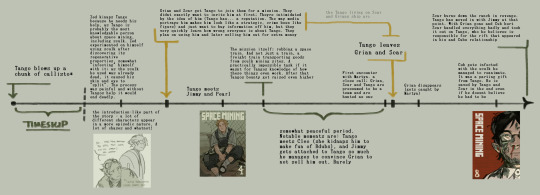
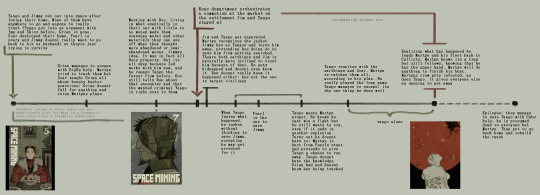
I tried to include the absolute most important parts. Doesnt look very well but i hope its at least readable
* Everything starts when Tango blows up a part of callisto. He worked there on a practically illegal sculk mining site; everything was meant to be kept secret, obviously, so when it turned out that the sculk is actually alive, parasitic and infecting everyone at a rapid pace, there was little help they could get. The outbreak was catastrophic but with HASA being a govermnent organisation that set up an illegal mining site not only outside of their controled area, but also in the solar system (which was and still is considered something like a buffer state... in space. At the time of the story lots of people from different places live there because its considered peaceful enough) there is no way they would get involved. So the few remaining survivors chose to blow up the mining site to save themselves. It both did and didnt work as intented, destroying a chunk of the moon and succesfully sealing the cave system, but also killing the remaining miners, with Tango being the sole survivor. Despite being a great asset to the company (he is, despite it all, considered the father of modern space mining), everything that happened was swifly pinned on him, with HASA claiming everything happened behind their back. Tango became a wanted terrorist in one day. An important note about the worldbuilding is that everything is corrupted and not good
More information to be found here. I havent linked every post ive ever made about it, just the ones i think are the most important! every space mining related thing can be found in the space mining au tag. This part will be updated with new information whenever i post it!
Designs:
Tango and Jimmy / Scar / Hotguy Scar / Grian / Pearl (+ info) / Joel / Martyn / Skizz / Impulse / Scott (+ info) / Bdubs and Cleo / pre-retirement Cleo, Lizzie and Gem / Ren / Doc
About:
Character relationship chart (not everyone is included)
Desert duo/Ranchers/Imp and Skizz relationships
More about desert duo / more about the ranchers / more about Impulse and Skizz + space mining as a whole
More about Scott and Jimmy + space stations
Etho and Bdubs (and Cleo) / more about Etho
Cub (and the burning of the ranch)
More about Grian
Pearl (+ design)
Martyn
Gem
Doc
Zeds full reference/design isnt included because it isnt up to date.
847 notes
·
View notes
Text
Route to Eutopia - New WIP IF

DEMO(28K) I CHARACTER DOSSIERS I PLAYLIST (TBA)
You have one year left to live.
But are you afraid of dying? Probably not. Since you don’t even know how to live your life. You have been hidden away from public eye since young. And the only friend you have is an Alter, humanoid species born to only serve other people and nothing else. Alters live so ‘people like you’ could live.
That makes the two of you. Alive. But never here. Never lived.
If opportunities arise, would you take a chance to change it? Only you can answer.
In a world where feeling nothing at all is better than letting your emotions rule over you, your choice to break those rules and make a change will paint a new shade of history that no one ever could.
Hidden behind shut doors to live your quiet life as a secret child of Bastien Palmer, Sole Leader of Eutopia paradise, you never experience anything except for repeating the same old routine your entire life. You are the existence which should not be known, not just for the reason that you are the byproduct of your father and his secret lover. But also because of your frightening ‘Alter-like’ eye color, most of it is silver like any Stargaze–but nevertheless… tinted shamefully by crimson streaks.
You are told to stay away from public eyes for the sake of Palmer’s reputation in which you feel obliged to. However, your life of peaceful solitude will never be the same again after tonight…
Route to Eutopia is a violent dystopian loosely-conceptual interactive story where you are a bystander surrounded by The Chosen One of your own choice. You are to designate whether this story will head towards the direction of mutual peace between Alters– a human-like species believed to be plagued by uncured disease since birth– and Stargazers —a group of survivors whose ancestors once lived on a faraway planet before an inevitable disaster occurred and forced them to flee into another dimension, or towards a doom fate that cannot be reversible.
To be noted; RtE is a heavily-relationship based game (not necessarily in platonic/romantic sense) each of your interactions with any character will determine the tone and purpose of their motivation. Any choice you have chosen, make sure to embrace the consequences of your action at your own expense.
With that being said, it is also worth mentioning that you don’t need to engage into a romance or specific relationship with any character to complete the story.
RtE also rated 18+ for strong language, suggestive contents, disturbing topics such as racism, sexism, discrimination against queer people, explicit descriptions of violence, murders, drug use and sexual behaviors of certain characters with optional intercourse scenes.
Setting
RtE takes place in a post-apocalypse society where the concept of time is lost and any history known was only speculations at best and rumour at worst. Trying to maintain their sense of utopia, Stargazers built and operated their space colony as a temporary base for self-preservation (in which only fews know details about) called ‘Eutopia’.
In this dystopian paradise people’s sole purpose of living was fixated on surviving. And in order to do that, the whole population creates a solid ground rule not to let themselves ‘feel’ about other emotions that do not serve for public favors. Hence, you will be challenged to adapt to several situations and handpick the best flavor of your actions based on the emotions you have learnt or developed from your surroundings.
Who do you play as?
For now, you will be playing as a secret child of Bastien Palmer, the leader of Stargazers who already has a wife and two other perfect children, your younger sister and brother. Ones you have never interacted with nor you ever get the chance to.
MCs subjectively considered a white sheet which you can paint anything on by your preferences. Explore the world full of colorful emotions or bottomless pit of numbness by your own choices.
But remember, Eutopia is a place where everything goes according to one simple rule ‘To survive’ hence the marriage between a man and woman will be set as the norm and only truth, and someone who will state otherwise must face and suffer the ugliness of social standards accordingly. However, I do not encourage any transphobic/homophobic behavior of the characters in this story. Please kindly be assured of that.
There might be a chance where you can start off as other characters, that is, however, still a subject-to-change matter as of now.
Introduction to the Chosen Ones [ ROs]
**Please be aware of mild spoilers below**
Vegaris (M/F) 19 Star-crossed lovers or Nemesis route, The Rebel.
They would do anything to survive, even if it means to betray the only person who trusts them deeply… like you.
Vegaris is an Alter who has so many sides hidden behind closed doors. Unpredictable, cunning, hot and cold are the words that describe them best. Due to their traumatic childhood (much like other Alters on Eutopia), they have a deep-root hatred for Stargazers. Although they were brought in by your family and treated almost the same as one of your father’s own kids. They still witness the unfairness of being an Alter in society and never afraid to point the wrong in other people’s doings.
Their usual mask, however, is one where you cannot crack open that easily. They always remain calm and composed in front of you, and only show their fangs when circumstances arise.
Dana/Darren Regency (M/F) 22 Childhood friends, Forbidden route, The Face.
For a person who seems to be easy to read as much as an open-book, they sure talk with silence better than with their own voice.
A poster girl/boy for Regency Academy. Your former childhood friend (for some unknown reason, they're trying their hardest to avoid you) and an only child to the Head of Deans at Regency, Sandalphon. They are the precise image of how one should raise a Stargazer. Being a honor student. A model citizen. And a perfect ideal partner. They are assigned to be married with the most capable genetic-wise fiancé. As popular as they appear to be to the public, their private life (as private as it can be) is still a gigantic loophole for most imprudent reporters trying to catch even just a glimpse.
It seems like what they are trying to avoid is not just you, but the entirety of Eutopia.
Sandalphon Regency (M/F) 40 Age-difference, Single-parent route, The Pacifist.
Do you believe in something just because it's true, or it becomes the truth only when you believe in it?
Sandalphon is the most powerful influence among the deans of Regency. A group of people that has control over governing matters even beyond that of Bastien Palmer, the President. For Sandal, they are anything and everything people could ever ask for in a Regency. Kind, generous, well-versed with every branch of knowledge in the universe. Never wrong in anything. And never judge anyone based on their bias.
If only people knew the truth, they’d probably beg to differ.
Maybe they are just good at hiding beneath that gentle facade, maybe a calculated mind with strings to pull works best with neutral suggestions... who knows?
One more hidden character will be revealed in the demo, Into the Madness route, The Savior.
[ Classified info. ]
**There will be two sub ROs and flings to be introduced later in the story.**
More info will be announced.
Demo 1st update : 24/01/2024 Chapter 1 (28k codes excluded)
Datalog is completed roughly til the end of the story. Coding and polishing will certainly take time. Any more updates will be announced solely on this blog.
Reblogging is appreciated. Thank you!
#if wip#interactive fiction#cog#choice of games#hosted games#if demo#interactive game#if game#dystopia#cyberpunk#space opera#interactive novel#choicescript#dashingdon
565 notes
·
View notes
Text
In the war between Israel and Hamas, there have been far too many casualties—thousands of innocent civilians have died, primarily in Gaza. But this war has another less visible casualty: the hundreds of thousands of Jewish immigrants to Israel from the Middle East and North Africa known as Mizrahi, whose history is being erased from the popular narrative about Israel. My community is among them.
When angry protesters hurl charges of apartheid and colonialism at Israel, they are, knowingly or not, repudiating the truth about Israel's origin and the vast racial and ethnic diversity of its nation.
I was born and raised in Iran in a family of Jewish educators. I came of age during the tumultuous years of the Iranian revolution, just as Ayatollah Khomeini rose to power in 1979, and soon thereafter, annihilated his opposition—feminists, leftists, even the Islamic Marxists who had long revered him as their spiritual leader. Until 1979, if anyone had told my observant Jewish family that we would someday leave Iran, we would have laughed. In fact, at our Passover seders, the words "next year in Jerusalem," were always followed by chuckles and quips, "oh, yeah, sure, Watch me pack!" all underlining our collective belief that we were exactly where we intended to remain. We loved Israel, but Israel was a Nirvana—a place we revered but never expected to reach.
The 30 years preceding the Islamic revolution had led the Jewish community to believe that the dark days of bigotry were behind them. And for good reason! When my father was a schoolboy in the late 1930s, he was not allowed to attend school on rainy days. In the highly conservative town where he grew up, in Khonsar, his Shiite neighbors considered Jews "unclean," or Najes. They barred them, among other things, from leaving their homes on rainy days, lest the rainwater splashed off the bodies of the Jews and onto the Muslim passersby, thus making them "unclean," too. Yet, that same boy grew up, left the insular town, attended college in Tehran, earned a master's degree, and served in the royal army as a second lieutenant. (To his last day, my father's photo in military uniform was among his most prized possessions.) After service, he became the principal of a school, purchased a home in what was then a relatively upscale neighborhood of Tehran. The distance between my father's childhood and adulthood far surpassed two decades. It was the distance between two eras—between incivility and civility, bigotry and tolerance.
Yet, as if on cue, the demon of antisemitism was unleashed again. The 1979 Islamic revolution summoned all the prejudices my father thought had been irretrievably buried. One day, on the wall across our home, graffiti appeared, "Jews gets lost!" Soon thereafter, the residence and fabric store my aunt and her extended family owned in my father's childhood town were set on fire after a mob of protesters looted it. Within days, she and her family, whose entire life's savings had burned in that fire, left for Israel. As young as I was, I could see that the regime was indiscriminately brutal to all those it deemed a threat to its reign, especially secular Muslims. But the new laws were specifically designed so that non-Muslims, and women, all but became second-class citizens. Members of religious minorities, especially the Baha'i, could no longer eye top jobs in academia, government, the military, etc. Restaurateurs had to display signs in their windows making clear that "the establishment was operated by a non-Muslim." In a court of law, members of religious minorities could offer testimony in criminal trials, but theirs would only count as half that of a Muslim witness. Jews were once again reduced to Dhimmis—tax-paying citizens who were allowed to live, but not thrive. Then came a handful of executions of prominent Jewish leaders in the early months after the revolution, which sent shockwaves through the community. Jewish schools were allowed to operate, but under the headmastership of Muslims who were officially appointed.
Within a few years after the rise of Ayatollah Khomeini to power, the Jewish population of Iran, which once stood at 100,000, shrank to a fraction of its size. Today, of the ancient community whose presence in Iran predates that of Muslims, only 8,000 remain. For centuries, Iran has been home to the most sacred Jewish sites in the Middle East outside of Israel. But those monuments have either fallen into disrepair or are targets of regular attacks by antisemitic mobs. Only last week, the tomb of Esther and Mordecai—the memorial to the heroine and hero from the Book of Esther who saved the Jews from being massacred in ancient Persia, was set on fire.
How is it that the 90,000-plus who left Iran, many for Israel, are now deemed as occupiers? How do Iranian refugees fleeing persecution become "colonizers" upon arrival in Israel? These families, my aunt among them, were not emissaries of any standing empire, nor were they returning to a place where they had no history. For them, Israel was not a home away from their real homeland. It was their only homeland. The vitriolic slogan that appeared across my home in 1979 demanded that we "get lost!" In 2024, once again, the same Jews are being called upon to leave, this time Israel. Where, then, are Jews allowed to live?
Iranian Jews were not alone. Jews from Iraq, especially in the aftermath of the 1941 pogrom called Farhood, similarly fled their homeland. So did the Jews of Yemen, Tunisia, Egypt, Turkey, Syria, Morocco, Algeria, Ethiopia, Afghanistan, etc. All, destitute and dejected, they took refuge in Israel. Today, they make up nearly 50 percent of Israel's population. To call such a nation colonial GRAVELY misrepresents the facts about Jews and Israel.
In his timeless essay, Looking Back on the Spanish Civil War, George Orwell said that in the Spain of 1937, he "saw history being written not in terms of what happened but of what ought to have happened according to various 'party lines.'" With the alarming rise of antisemitism around the world, and in light of the bloody attacks on Israel by Hamas on Oct. 7, the greatest massacre of Jews since World War II, 2024 bears an uncanny resemblance to Orwell's 1937. But perhaps in no way more ominously than the way truth has been upended to serve an ideological narrative—one in which Jews, who have lived uninterruptedly in that land for more than two millennia, are cast as white non-indigenous interlopers, with no roots in what has always been their ancient homeland.
A public scholar at the Moynihan Center (CCNY), Roya Hakakian is the author of several books including, Journey from the Land of No: A Girlhood Caught in Revolutionary Iran (Crown, 2005).
#jumblr#antisemitism#leftist antisemitism#mizrahi history#erasure of jewish history#erasure of mizrahi history
215 notes
·
View notes
Text
Let me talk Anarchism

Okay, let me quickly talk about it, because I am so annoyed with this. For once in the way how it relates to Solarpunk, but also in relation to media. And yeah, choosing good old Hobie here, because while it was kinda played for humor with him a lot, he was one of the few characters in media I have seen, that are actually kinda a positive representation of anarchism.
You know, media in general misrepresents anarchism all the time. Sometimes for propaganda purposes, and sometimes because the creator does not know any better and has grown up with said propaganda themselves and just believe it. Most of the time, media hence represents Anarchism as "Society without rules!", which is most certainly not what anarchism is.
The word Anarchism comes from the Greek An Arkhos, which translates into "Without Rulers". That is exactly what Anarchism means. Anarchism is a political philosophy that aims to get rid of all unjustified, involuntary hierarchies.
This is, by the way, why Anarcho Capitalism might use the word, but can never be anarchist, because capitalism aims to build unjustifiable hierarchies. It is exactly the goal of the system. So Anarcho Capitalism is a contradiction in itself.
An anarchist society will still have rules. We know that, because there have actually been societies in history, that today we would call anarchist. It is just that instead of a sort of some group of people ruling over everyone else deciding on those rules, everyone would get to have their say in it. That is, why those historical examples of anarchism for the most part have sprung up in smaller, close-nit societies, because before the age of the internet it would've been rather hard to make everyone's voice heard.
If you are wondering: "But isn't democracy already doing that?" The answer is no. Because democracy is not working, due to the politicians having all the power and the populus not being able to force them to stick to whatever they promised during the election. We cannot recall politicians, who have lied to us. So for the most part, it is the people with big money, who influence the politics. People, who were not even elected, but who the politicians will try to please more than the average joe, who has voted for them.
It is another reason, why a lot of anarchists are against the police. Not only do they use police violence, but they are in a position, where they are allowed to use it against people, often without much reprecussions. And all of that, without the people having any say in who does and does not get to be a police(wo)man. It is another unjustified hierarchy.
And, yes, it is also why anarchists tend to be against the concept of nation states. Because internationally some states rule over others. Colonialism might've ended on paper, but it has not ended in practice. The reason some nations are poor, while others are rich, is that the poor nations get exploited by rich nations. An unjustified hierarchy. And that is without starting on the fact how many borders have been drawn by people, who had no right to do so.
On the small scale, though, anarchism first and foremost is about helping people. Mutual aid is one of the core principles of the anarchist movement. Helping people, who got left behind by the unjustified state and the people who are in power. It is also about empowering people and allowing them to find their own voice.
See, here is the fact: One of the core believes in anarchy is, that people are actually not terrible. If the state stopped existing tomorrow, people would not run around, murder and pillage. They would still help one another. We have seen this time and time again when through war or natural catastrophies systems of power have failed. People help each other. Because we are actually a pretty social species.
This is also why I absolutely loathe the depiction we see in a lot of media. Most of all in Legend of Korra. Where not only the Red Lotus, as an anarchist group, does not do jack shit in terms of mutual aid and things like that... We also see basically the Earth Kingdom go to ruins and violence within minutes of the Earth Queen having been killed. Like, no, that is not how people would react in that situation. There would not be instant riots or some shit. Jesus. What made them think that?
And yes, sure. Some anarchists might riot on the streets, because they riot AGAINST the unjust system. But always remember: Usually, when there is police violence for example against a protest, it is your friendly neighborhood anarchist, who will be willing to put themselves between you and the police.
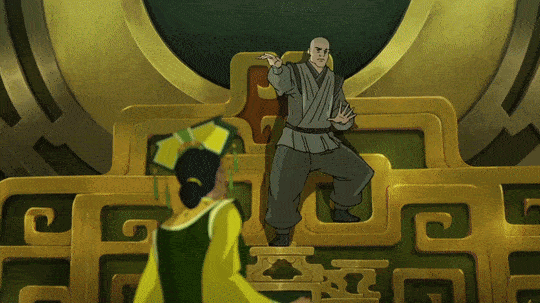
#Solarpunk#anarchism#anti capitalism#anti patriarchy#communism#anarcho communism#fuck the police#media#politics#the legend of korra#spider punk#astv hobie
747 notes
·
View notes
Text



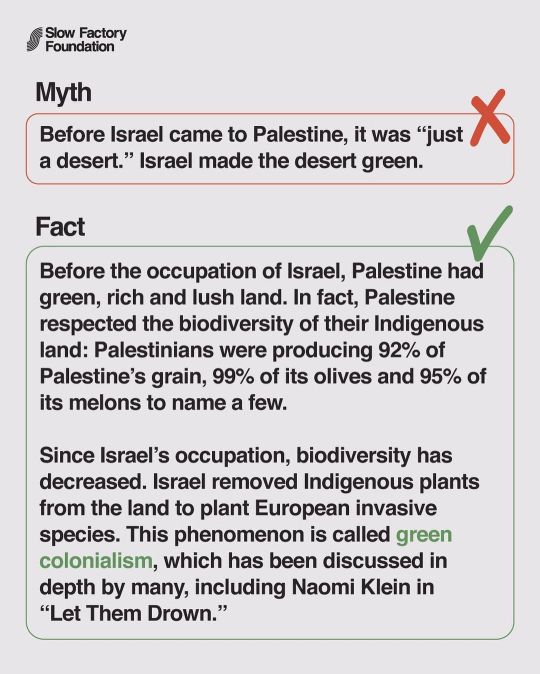
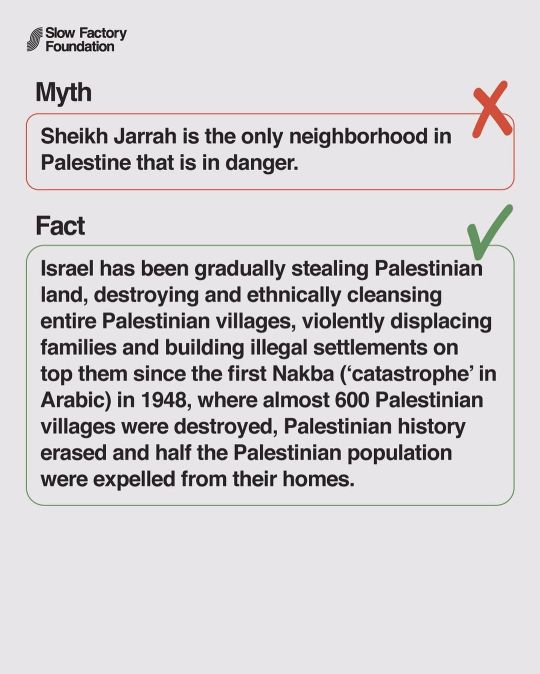
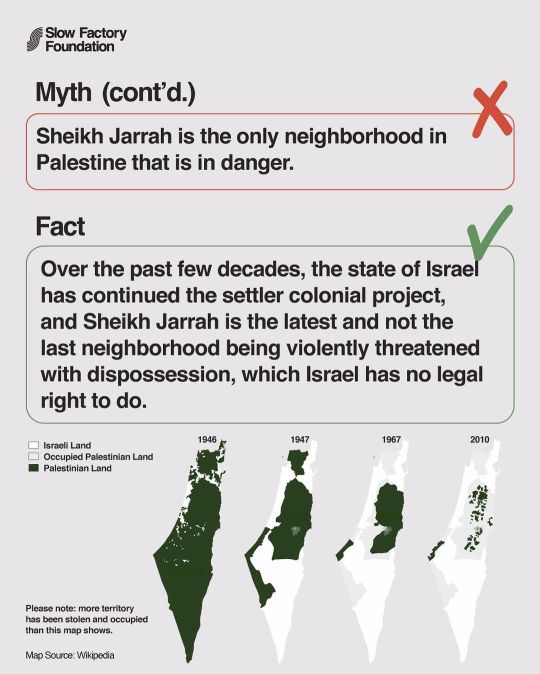
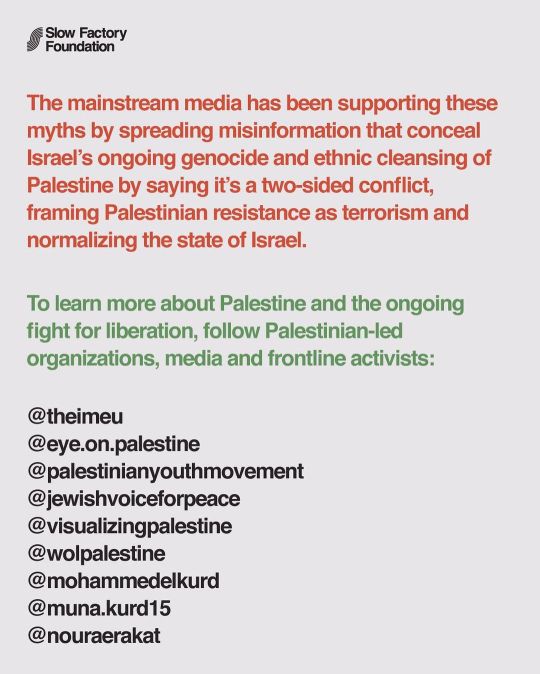
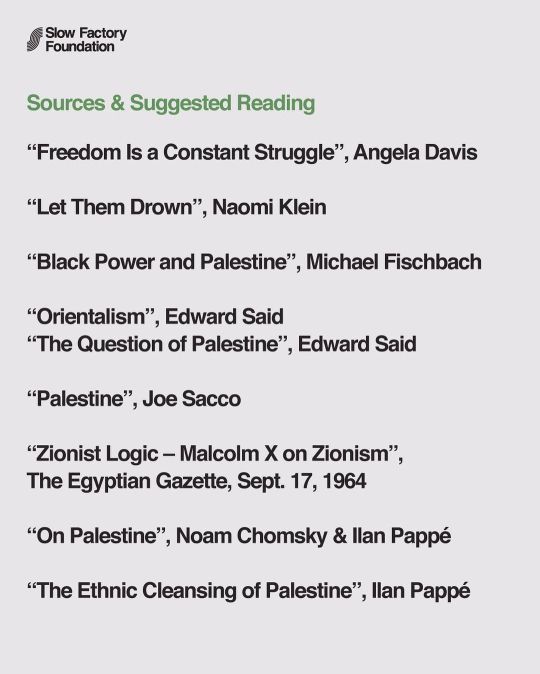
[This post is a series of images from an infographic by the Slow Factory Foundation originally posted May 2021. The first image is a photo with text over it. The photo shows a massive fireball in the middle of a group of buildings, with a massive black cloud rising from the flames that is bigger than the buildings themselves. The building just behind the fireball is low, rectangular, and lit up bright orange. Behind that building, there is a city lit up at night. Hundreds of buildings stretching into the distance, a thousand glimmering lights.]
What is happening in Palestine is not complicated; it's settler colonialism & ethnic cleansing.
Debunking Misinformation around Palestine.
Myth ❌
Palestine and Israel are in "conflict."
Fact ✅
What is happening in Palestine is settler colonialism, military occupation, land theft and ethnic cleansing. A conflict means there is equal footing, which is not the case. There is an active oppressor (Israel) and an oppressed (Palestine). A colonizer (Israel) and a colonized (Palestine). This is not a conflict.
[Three images of headlines with the word 'conflict' crossed out in red ink.]
Note: According to the Congressional Research Service,
Israeli military occupation has been supported by US aid with $3.8bn a year paid for by U.S. tax dollars since 2016 for the next 10 years.
It's also supported by other colonial countries including Canada, Australia, France and Belgium.
Myth ❌
Before Israel came to Palestine, it was "just a desert" and Israel made the desert green.
Fact ✅
Before the occupation of Israel, Palestine had green, rich and lush land. In fact, Palestine respected the biodiversity of their Indigenous land: Palestinians were producing 92% of Palestine's grain, 99% of its olives and 95% of its melons to name a few.
Since Israel's occupation, biodiversity has decreased. Israel removed Indigenous plants from the land to plant European Invasive species. This phenomenon is called green colonialism, which has been discussed in depth by many, including Naomi Klein in "Let Them Drown."
Myth ❌
Sheikh Jarrah is the only neighborhood in Palestine that is in danger.
Fact ✅
Israel has been gradually stealing Palestinian land, destroying and ethnically cleansing entire Palestinian villages, violently displacing families and building illegal settlements on top them since the first Nakba ('catastrophe' in Arabic) in 1948, where almost 600 Palestinian villages were destroyed, Palestinian history erased and half the Palestinian population were expelled from their homes.
Myth (cont'd.) ❌
Sheikh Jarrah is the only neighborhood in Palestine that is in danger.
Fact ✅
Over the past few decades, the state of Israel has continued the settler colonial project, and Sheikh Jarrah is the latest and not the last neighborhood being violently threatened with dispossession, which Israel has no legal right to do.
[Images of a map showing the drastic decrease in Palestinian landmass from 1946 to 2019. In 1946, Palestine was 99% Palestinian land. In 1947, it decreased to 40%. In 1967, to 30%. And in 2019, less than 20% of Palestine is Palestinian land. The remaining areas are being encroached on by occupied Palestinian land, meaning occupied by Israelis. The rest is Israeli land.]
The mainstream media has been supporting these myths by spreading misinformation that conceal Israel's ongoing genocide and ethnic cleansing of Palestine by saying it's a two-sided conflict, framing Palestinian resistance as terrorism and normalizing the state of Israel.
To learn more about Palestine and the ongoing fight for liberation, follow Palestinian-led organizations, media and frontline activists. [@Instagram / Facebook]
@theimeu / Institute for Middle East Understanding ( IMEU )
@eye.on.palestine
@palestinianyouthmovement / Palestinian Youth Movement (PYM)- حركة الشباب الفلسطيني
@jewishvoiceforpeace / Jewish Voice for Peace
@visualizing_palestine / Visualizing Palestine
@wolpalestine [Censored by Meta]
@mohammedelkurd / Mohammed El-Kurd
@muna.elkurd15 / Muna Nabeel Elkurd
@nouraerakat / Noura Erakat
Sources & Suggested Reading
Freedom is a Constant Struggle by Angela Davis
Let Them Drown by Naomi Klein
Black Power and Palestine by Michael Fischbach
Orientalism by Edward Said
The Question of Palestine by Edward Said
Palestine by Joe Sacco
"Zionist Logic — Malcolm X on Zionism" in The Egyptian Gazette, Sept. 17, 1964
On Palestine by Noam Chomsky and Ilan Pappé
The Ethnic Cleansing of Palestine by Ilan Pappé
[End of images]
#the slow factory#palestine#gaza#angela davis#naomi klein#michael fischbach#edward said#joe sacco#malcolm x#noam chomsky#ilan pappé#Noura Erakat#Muna Nabeel Elkurd#Mohammed El-Kurd#Eye On Palestine#IMEU#Palestinian Youth Movement#Jewish Voice for peace#Visualizing Palestine
188 notes
·
View notes